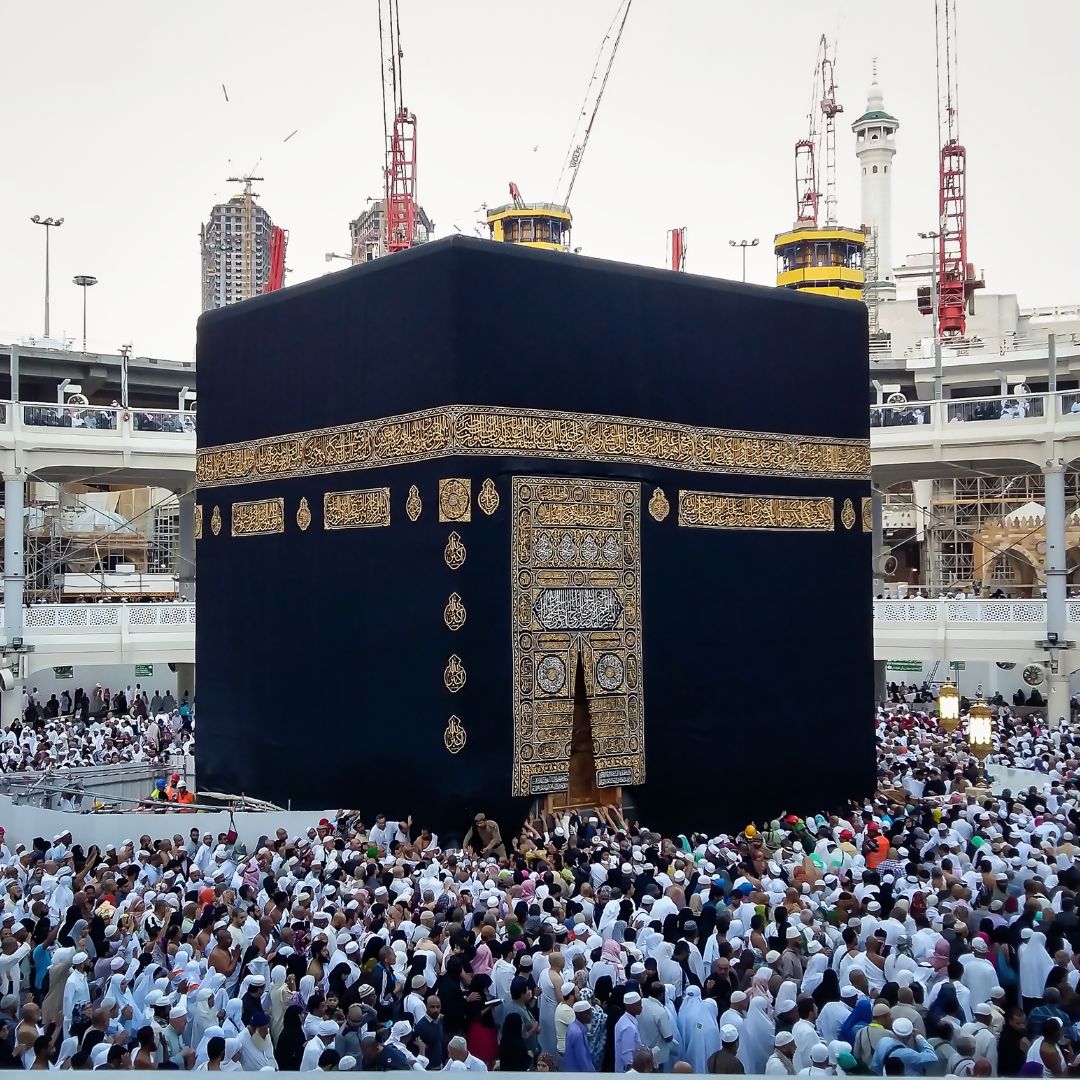Blog
How to Become a Muslim

Becoming a Muslim is a profound and life-changing decision. Islam is a monotheistic faith that believes in the oneness of God (Allah) and follows the teachings of the Prophet Muhammad (PBUH). The journey to embracing Islam is deeply personal and transformative. Here, we will guide you through the process of how to become a Muslim, supported by hadith references and important facts about Islam.
1. Understanding the Core Beliefs of Islam
To begin your journey to becoming a Muslim, it’s crucial to understand the core beliefs of the faith. Islam is built on the Five Pillars of Islam, which are the foundation of a Muslim’s life. These are:
- Shahada (Faith): The declaration of faith that there is no god but Allah, and Muhammad is His messenger.
- Salah (Prayer): The performance of daily prayers.
- Zakat (Charity): Giving a portion of your wealth to the less fortunate.
- Sawm (Fasting): Fasting during the month of Ramadan.
- Hajj (Pilgrimage): The pilgrimage to Mecca, which is performed once in a lifetime by those who are able.
The Shahada is the most significant statement in Islam, signifying the acceptance of the oneness of God and the finality of the Prophet Muhammad’s (PBUH) message.
Hadith Reference on Faith:
The Prophet Muhammad (PBUH) said: “Whoever says, ‘There is no god but Allah,’ and Muhammad is the messenger of Allah, then he is a Muslim.” (Sahih Muslim)
2. Declaring the Shahada (Testimony of Faith)
The first and most important step in becoming a Muslim is to declare the Shahada (Testimony of Faith). This declaration consists of two key phrases:
- La ilaha illallah (There is no god but Allah).
- Muhammadur rasulullah (Muhammad is the Messenger of Allah).
By reciting this declaration sincerely, you embrace the faith of Islam. The Shahada is often recited in Arabic, but it can be understood in any language.
Hadith Reference on Shahada:
The Prophet Muhammad (PBUH) said: “Whoever says ‘There is no god but Allah and Muhammad is the Messenger of Allah,’ and believes it sincerely from his heart, will enter Paradise.” (Sahih Muslim)
3. Learning the Essentials of Islam
Once you have recited the Shahada, it’s important to learn the basic teachings of Islam. This includes the Five Pillars of Islam, understanding the Quran (the holy book of Islam), and the Hadith (sayings and actions of the Prophet Muhammad, PBUH). It is recommended to start with reading translations of the Quran and learning about the life of Prophet Muhammad (PBUH) through authentic Hadiths.
Key Facts About Islam:
- The Quran is the word of Allah revealed to the Prophet Muhammad (PBUH) over a span of 23 years.
- The Hadith is a collection of sayings, actions, and approvals of Prophet Muhammad (PBUH) that help explain the Quran and serve as a guide for Muslims.
- Tawhid is the concept of the oneness of Allah and is central to Islamic belief.
Hadith Reference on Seeking Knowledge:
The Prophet Muhammad (PBUH) said: “Seeking knowledge is an obligation upon every Muslim.” (Sunan Ibn Majah)
4. Practicing the Five Pillars of Islam
As you continue your journey to becoming a Muslim, it’s important to begin practicing the Five Pillars of Islam. Here’s a brief overview:
- Salah (Prayer): Muslims perform five daily prayers—Fajr, Dhuhr, Asr, Maghrib, and Isha. These prayers are essential for spiritual connection and discipline.
- Zakat (Charity): Muslims are required to give a portion of their wealth to those in need. This is a form of purification and a way to help those less fortunate.
- Sawm (Fasting): Muslims fast from dawn to dusk during the month of Ramadan, abstaining from food, drink, and other physical needs. It is a time for spiritual reflection and self-control.
- Hajj (Pilgrimage): If possible, Muslims are required to perform the pilgrimage to Mecca once in their lifetime.
Hadith Reference on Charity:
The Prophet Muhammad (PBUH) said: “The best of people are those who are most beneficial to others.” (Daraqutni)
5. Embracing the Islamic Community (Ummah)
As a Muslim, you become part of the Ummah—the global community of Muslims. It is important to connect with local Muslims for support, learning, and growth in your faith. Attending the mosque for prayer, learning from scholars, and engaging in community activities are key aspects of Islamic life.
Hadith Reference on Unity:
The Prophet Muhammad (PBUH) said: “The believers are like a single body; when one part of the body hurts, the whole body feels the pain.” (Sahih Muslim)
6. Maintaining a Good Character and Conduct
Islam emphasizes the importance of good character and moral conduct. As a Muslim, it is essential to embody kindness, patience, honesty, humility, and compassion towards others. Following the example of the Prophet Muhammad (PBUH) in your interactions with others will help you live a meaningful and righteous life.
Hadith Reference on Good Character:
The Prophet Muhammad (PBUH) said: “The best of you are those who have the best character.” (Sahih al-Bukhari)
Conclusion
Becoming a Muslim is a beautiful and transformative decision that brings one closer to Allah. By declaring the Shahada, learning the teachings of Islam, and practicing the Five Pillars, you begin your journey in faith. With time, continued learning, and involvement in the Muslim community, you can grow spiritually and live a life of purpose, peace, and compassion.
Final Note:
Islam is a faith of peace, submission, and worship of Allah alone. It is a journey of self-improvement and connection with the Creator, aiming to lead a balanced and purposeful life.
“Indeed, this Quran guides to that which is most suitable.” (Quran 17:9)
May Allah guide you on your journey to embracing Islam and grant you success in this beautiful path.
Blog
Master Surah Yaseen with Tajweed: Easy Rules & Tips for Perfect Recitation

Reciting the Quran with Tajweed isn’t just about beauty it’s about respect. Every word of the Quran deserves precise pronunciation, and Surah Yaseen (the “Heart of the Quran”) is no exception.
Learning Tajweed ensures your recitation pleases Allah and avoids misinterpretations. In this guide, discover simple Tajweed rules, grab a free Surah Yaseen Tajweed PDF, and unlock spiritual rewards!
Why Tajweed Matters for Surah Yaseen
Tajweed means reciting the Quran with proper articulation, rhythm, and tone. Even small pronunciation errors can change meanings, leading to unintended sins.
For example:
- Ghunnah (nasal sounds): Missing these alters words like (noon).
- Madd (elongation): Shortening vowels like “ا” (alif) distorts verses.
Tip: Learning Tajweed transforms your recitation from “good” to angelic!
How to Read Surah Yaseen with Tajweed: Key Rules
Master the Basics:
- Makharij (Articulation Points): Practice letters from their correct throat, tongue, or lip positions.
- Sifat (Characteristics): Differentiate between heavy (tafkheem) and light (tarqeeq) letters.
Focus on Common Mistakes:
- Qalqalah (echo sounds): Bounce letters like ق, ط, ب, ج, د when they have a sukoon.
- Idgham (merging): Blend letters like ن into و, ي, م, or ن with proper nasalization.
Use Visual Aids:
- Color-Coded Quran: Download our Surah Yaseen Tajweed PDF (linked below) with color-marked rules for vowels, stops, and elongation.
Free Surah Yaseen Tajweed PDF: Learn Offline!
Struggling to memorize rules? Our Surah Yaseen Tajweed PDF simplifies learning:
- Color-Coded Text: Red for elongation, green for nasal sounds, etc.
- Rule Explanations: Side notes clarify each Tajweed marker.
- Practice Pages: Trace Arabic script to improve fluency.
Read Online: Link Perfect for beginners!
Share the Blessings: Spread Surah Yaseen
Did you know sharing Quranic resources earns continuous rewards (Sadaqah Jariyah)? Here’s how:
- Forward the PDF: Send it via WhatsApp, email, or social media.
- Print Copies: Distribute at mosques or Islamic centers.
- Teach Others: Host a Tajweed study group using the guide.
FAQs: Tajweed Made Simple
Q: Can I learn Tajweed online?
A: Yes! Join YouTube tutorials or apps like Quranic for interactive lessons.
Q: Why use a color-coded Quran?
A: Colors help visual learners spot rules faster—ideal for kids and adults!
Q: Is Tajweed mandatory for recitation?
A: Yes! Proper Tajweed ensures correct meaning and respect for Allah’s words.
Top Tips for Effective Practice
- Start Small: Recite 5–10 verses daily with a Tajweed teacher.
- Record Yourself: Compare with reciters like Mishary Rashid Alafasy.
- Dua Before Reciting: “رَبِّ زِدْنِي عِلْمًا” (O Allah, increase my knowledge).
Conclusion: Elevate Your Recitation Today
Mastering Surah Yaseen with Tajweed isn’t just about rules it’s about connecting deeply with Allah’s words.
Use our free Tajweed PDF, practice consistently, and share this guide to multiply rewards. Remember, every correctly recited verse brings you closer to Jannah! 🌟
Surah Yaseen Tajweed rules, learn Tajweed online, color-coded Quran PDF, Surah Yaseen pronunciation, free Islamic resources, Quran recitation tips, Tajweed for beginners, spiritual rewards of Quran.
Blog
Surah Yaseen Mubeen Wazifa: Unlock Spiritual Growth & Life Solutions

Feeling stuck in life? Surah Yaseen Mubeen Wazifa might be your key to spiritual peace and success. This powerful Islamic practice focuses on the word “Mubeen” (meaning clear or evident), which appears seven times in Surah Yaseen the 36th chapter of the Quran. Let’s explore its life-changing benefits, how to perform it, and why it’s a go-to spiritual remedy for Muslims worldwide.
What is Surah Yaseen Mubeen Wazifa?
Surah Yaseen, found in Parah 22–23 of the Quran, is revered for its profound blessings. The Mubeen Wazifa involves reciting specific verses containing the word “Mubeen” to seek Allah’s guidance, protection, and solutions to life’s challenges.
Fun Fact: The word “Mubeen” highlights clarity—like a divine roadmap for your struggles!
Top Benefits of Surah Yaseen Mubeen Wazifa
Spiritual Upliftment
- Illuminates the heart, replacing anxiety with inner peace.
- Strengthens your bond with Allah through Quranic healing.
Unshakable Faith
- Builds resilience during tough times, fostering trust in Allah’s plan.
Solve Life’s Problems
- Addresses health issues, financial stress, or broken relationships.
Protection from Evil
- Acts as a spiritual shield against envy, black magic, and harm.
- Career & Relationship Success
- Attracts opportunities and mends conflicts with loved ones.
How to Perform Mubeen Wazifa: Simple Step
Set Your Intention (Niyyah)
- Begin with sincere devotion—seek Allah’s pleasure, not just worldly gains.
Recite Surah Yaseen
- Read the entire chapter, focusing on the 7 verses with “Mubeen.”
Daily Consistency
- Practice after Fajr or before sleeping for best results.
- Make Dua
- Ask Allah for your needs with humility (e.g., “Ya Allah, ease my hardships”).
Tip: Pair with Sadaqah (charity) to amplify blessings.
FAQs: Your Questions Answered
Q: How often should I recite this Wazifa?
A: Daily for 40 days is ideal, but even weekly recitation brings benefits.
Q: Can it fix marriage issues?
A: Yes! Many couples report renewed harmony after consistent practice.
Q: Are there health benefits?
A: Spiritual calmness reduces stress, improving overall well-being.
Q: What if I miss a day?
A: Restart without guilt—Allah values effort, not perfection.
Real-Life Success Stories
- Amina, 34: “This Wazifa helped me recover from debt and depression.”
- Imran, 28: “Lost my job, but landed a better one after 3 weeks of reciting!”
Pro Tips for Maximum Results
- Cleanliness: Perform ablution (wudu) before reciting.
- Quiet Space: Choose a distraction-free area.
- Patience: Trust Allah’s timing miracles happen gradually.
Conclusion: Transform Your Life Today
Surah Yaseen Mubeen Wazifa isn’t just a ritual it’s a divine conversation. Whether you seek peace, healing, or success, this practice opens doors to Allah’s mercy. Start today, stay consistent, and watch blessings unfold!
Blog
Hajj and Umrah According to Quran

As Muslims, we know that Hajj and Umrah are the most spiritually enlightening acts of worship. Although Hajj is obligatory and promises unmatched rewards and blessings, Umrah is no less, especially in the Holy Month of Ramadan. According to the Quran, the spiritual and ritual aspects of Hajj and Umrah provide exceptional insight into how the pilgrimage must be performed and why a Muslim should perform it.
If you are going to be one of the lucky USA citizens who have booked Umrah 2025 packages, you will soon get a chance to experience the spirituality of this journey. Before you embark on the journey, here are some aspects of the pilgrimage concerning the Holy Quran that you must know about. This will motivate you to perform your pilgrimage in a better way.
Hajj, The Obligatory Pilgrimage in the Light of Quran
Millions of chosen Muslims travel to the sacred city of Mecca for their pilgrimage every year. And those who cannot go for the pilgrimage just yet yearn to stand beside the Holy Kaaba and experience this faith-reviving journey. Unlike Umrah, Hajj is performed annually. This pilgrimage’s spiritual and ritual significance is undeniable, and you must know something about it before you plan your Hajj soon.
Spiritual Significance of Hajj
- Complete Submission to the Almighty
As you might already know, Hajj means completely submitting to the Almighty. You leave your home and work for a few days and embark on the journey to please Him. It also shows that you completely submit to Him and believe in His assistance. Hajj shows the willingness of the pilgrims to submit to whatever Allah Almighty has decided for them.
The Quran states in Surah Al-Baqarah (2:196), “And complete the Hajj and Umrah for Allah.”
The translation shows that this pilgrimage is for the Almighty alone.
- A Source to Purify Soul
In Surah Al-Hajj (22:27), Allah commands, “And proclaim to the people the Hajj. They will come to you on foot and every lean camel from every distant pass.”
This symbolises that Hajj is a journey of repentance and purification for the Muslims.
- Symbol of Equality and Unity
The extensive Hajj crowds represent unity and equality among Muslims. In the eyes of the Almighty, everyone is equal.
The Quran emphasises this unity in Surah Al-Hujurat (49:13): “O mankind, indeed We have created you from male and female and made you peoples and tribes that you may know one another.”
Umrah, The Voluntary Pilgrimage in the Light of Quran
Even though Umrah is not obligatory for Muslims, it has unmatched spiritual significance and countless benefits that make every Muslim want to perform it. If you have already applied for your Umrah visa and are planning to go for this spiritual retreat soon, here is something you must know about Umrah that will soothe your soul and excite you.
Spiritual Significance of Umrah
- Perfect Way to Seek Allah’s Mercy
Umrah has unlimited rewards and benefits. Who would want to miss the benefits of performing Umrah and seeking Allah Almighty’s mercy?
In Surah Al-Fath (48:27), Allah promises the forgiveness of sins for those who complete their pilgrimage with sincerity: “Indeed, Allah has shown His Messenger the vision in truth. If Allah wills, you will certainly enter the Masjid al-Haram in safety.”
- Source of Ultimate Forgiveness
We have many authentic references from Hadith that Umrah expiates a believer’s sins. It is your chance to ask for the forgiveness of the Almighty. The Quran encourages repentance in Surah At-Tahrim (66:8), “O you who have believed, repent to Allah with sincere repentance.” Repentance is the most beloved act to the Almighty. So, make sure that you utilize this opportunity perfectly for the forgiveness of all your sins.
Ritual Aspects of Hajj and Umrah in the Light of Quran
After you have learned the spiritual aspects of both Hajj and Umrah, let’s talk about the ritual aspects too. It will help you understand the significance of some of the pilgrimage’s primary rituals.
Entering the State of Ihram
If you are familiar with the pilgrimage, you already know about the state of Ihram. This state requires purity before you arrive at the pilgrimage sites. The Holy Quran provides evidence that sheds light on this state’s obligation to both Hajj and Umrah and explains its rules.
“Hajj is [during] well-known months, so whoever has made Hajj obligatory upon himself therein [by entering Ihram], there should be no indecent speech, misbehavior, or disputing during Hajj…” Surah Al-Baqarah (2:197)
Performing Tawaf
Another ritual familiar to both pilgrimages is the Tawaf, which involves circumambulating around the Holy Kaaba. The Quran describes the Kaaba as “the first house of worship established for mankind” (Al-Imran, 3:96), and the act of Tawaf represents the unity of believers in worshiping the One Almighty God.
Performing Sa’i
This ritual is performed at the sacred hills of Safa and Marwah. In Surah Al-Baqarah (2:158), the Quran states, “Indeed, Safa and Marwah are among the symbols of Allah.” Pilgrims walk between the two hills as an act of devotion and reflection on God’s mercy.
Summing Up
Hajj and Umrah are the dream of every Muslim. No one would want to miss out on the chance to stand in front of the house of the Almighty and yield all the rewards and blessings. If you want to be one of the lucky pilgrims from the USA this year, it’s time to contact an authorised Islamic travel agency in the USA and start planning your pilgrimage. Explore Umrah deals to find the best travel, accommodation, and services offers, ensuring you make the most of your spiritual journey. These Umrah deals will help you experience the pilgrimage most comfortably and affordably.
-

 Blog4 months ago
Blog4 months agoNazar Ki Dua In English Text
-

 Blog4 months ago
Blog4 months agoDarood Tanjeena
-

 Blog4 months ago
Blog4 months agoNazar Ki Dua
-

 Blog4 months ago
Blog4 months agoSurah Muzammil
-
Blog4 months ago
Surah Yaseen Read Online
-

 Blog3 months ago
Blog3 months agoSurah Yaseen Read Online
-

 Blog4 months ago
Blog4 months agoProphet (PBUH) Knowledge as Proven by Hadith?
-

 Blog4 months ago
Blog4 months agoHow to Become Muslim Shahada


